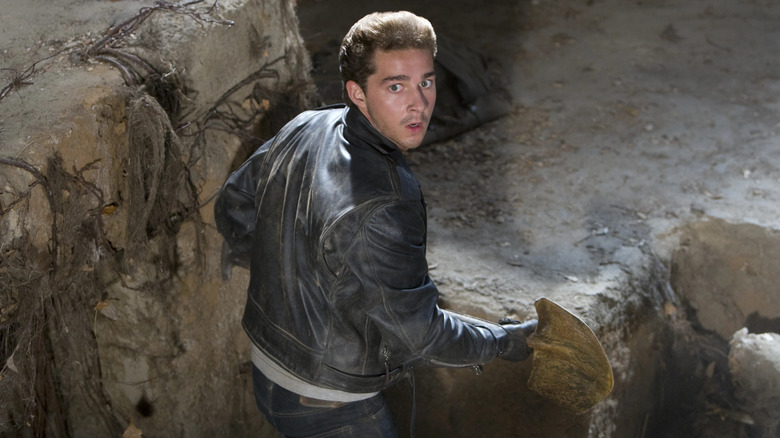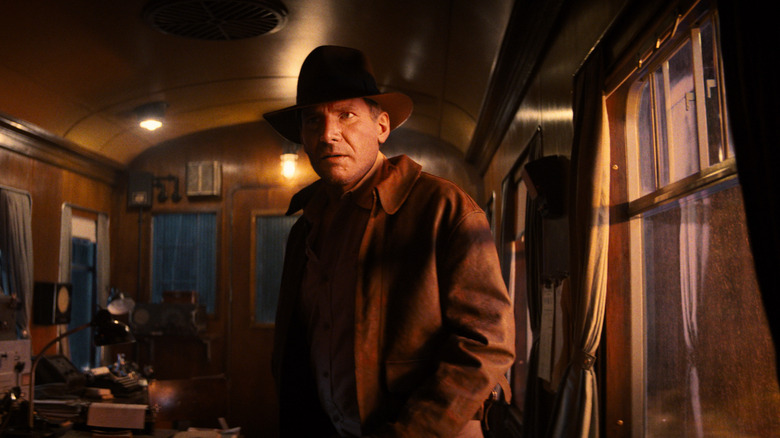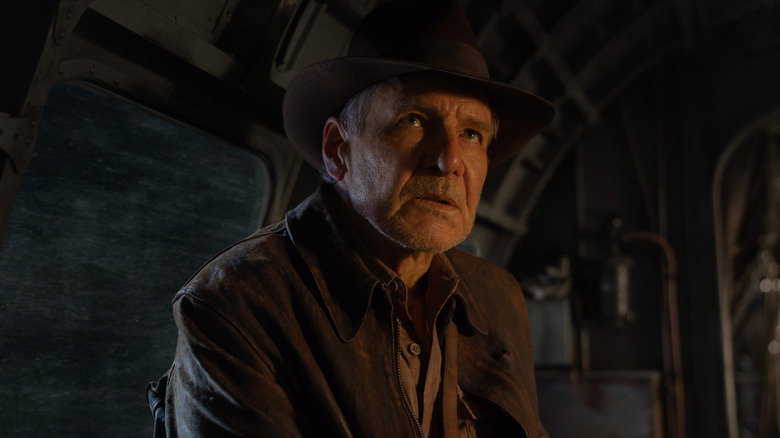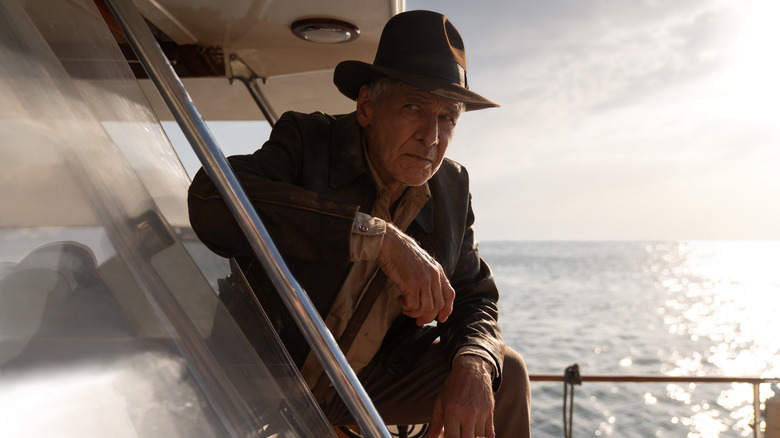Indiana Jones And The Dial Of Destiny Might Make You Care About Mutt Williams
Ever since the eminently lovable Ke Huy Quan turned up as Short Round in "Indiana Jones and the Temple of Doom," a whole generation of kids imagined what it'd be like to pal around with Harrison Ford's adventurer archaeologist, perhaps even how it might feel to actually be Indy's son.
That latent wish fulfillment was shattered when 2008's "Indiana Jones and the Kingdom of the Crystal Skull" was released, introducing the world to Henry Jones, Jr.'s actual flesh-and-blood kid: Henry "Mutt" Williams, played with snotty-tough-guy bravado by Shia LaBeouf. Granted, Indy wasn't much more thrilled to meet his illegitimate son than audiences were, having been gaslit by the boy's mother/his ex, Marion Ravenwood (Karen Allen) into thinking the young '50s Greaser was the wayward child of another of Marion's loves, the deceased (and therefore unseen) soldier Colin Williams.
A great many factors contributed to the general cultural distaste for Mutt: the fact that the film itself did him no favors, naming him after a typically derogatory name for a dog, having him act ornery and abrasive, and hinting that this could be our new heir to the Indiana Jones mantle (and franchise) going forward. LaBeouf's presence alone may have been the turnoff for some, as he was then ubiquitous thanks to the "Transformers" series, and his public image has sadly only soured as time has gone by.
All of this meant the latest (and final, at least for Ford) "Indy" adventure, "Dial of Destiny," would be saddled with questions of what to do about Mutt. The film pulls a neat double twist on this very issue, at first giving fans and the audience what they seem to want, then giving that choice weight and context that may, against all odds, actually make people care about Mutt Williams.
Giving audiences what they think they want
At first, "Dial of Destiny" doesn't seem to be doing what one expects it to, which is "course-correct" from the perceived problems with the prior installment. For the opening sequence, in which a younger Indy (a digitally de-aged Harrison Ford) first encounters this film's MacGuffin, Archimedes' Dial (aka the Antikythera), on a Nazi train filled with stolen treasure, the whimsical tone of the "Raiders" films is well intact, and even the first few scenes depicting an older Indy in 1969 New York City feel in harmony with the rest of the franchise.
Yet as the film goes on, there seems to be a sense of a knowing wink toward the movie's conspicuous absence of certain characters. Marion, who became Indy's wife at the end of "Crystal Skull," has her absence explained away quickly with a shot of a document announcing the couple's impending separation. Included on that document, if you have a quick eye, is a bit of legalese stating that the separating couple has no children.
At first, this feels like it might be a cheeky Easter egg, a joke at Mutt's expense that the audience can chuckle at. Yet later on, after Indy has been framed for murder by the ex-Nazi scientist Jürgen Voller (Mads Mikkelsen), a weary Jones stands outside a shop window filled with TV's broadcasting breaking news, in which a reporter discusses how the now-retired college professor and archeologist is on the lam. As the reporter's dialogue fades into the background, there's a brief mention of how Indy's son is now dead. It's the cruelest way Mutt could've been shifted out of the franchise: killed offscreen, with any mention of him shoved into the literal margins of the story, and it's a fate that many fans post-"Crystal Skull" likely wished upon the character.
Mutt Williams gets a dignified sendoff
Since Mutt's death is given such a slight, tossed-off reveal, it seems initially that "Dial of Destiny" is simply trying to make room for this movie's adventure to continue without the baggage of continuity or legacy characters. Yet director and co-writer James Mangold, along with co-writers Jez Butterworth, John-Henry Butterworth and David Koepp, has kept mentions of Mutt mostly quiet for the first half of the film for a reason.
As Indy and his goddaughter, Helena Shaw (Phoebe Waller-Bridge) sail toward their next attempt to recover the missing half of the Antikythera, the subject of the device's supposed power comes up; namely, its alleged ability to lead people to "fissures" in time that would allow them to change the past. Helena asks where Jones might go if he had the choice, and the still-grieving father doesn't hesitate to answer: he'd try and stop Mutt from enlisting and going to Vietnam, where the boy met his demise.
Ford's performance during this revelatory monologue is deeply affecting and effective, and the film does not let it go to waste. Indeed, the moment can be seen as the crux of Indy's character for this adventure, explaining his grumpier, more haggard demeanor (as well as his constant criticism of who Helena's become) as not merely being part of an older, more eccentric Indy but one who's still steeped in grief over his stubborn and impetuous son's short-sighted defiance. One of the major themes of "Dial of Destiny" is that there are fulcrums as well as "fissures" in the world's history, moments that change everything, and Mutt's death as one of thousands suffered by American soldiers during the conflict in Vietnam retroactively earns his character a tremendous amount of pathos and importance.
James Mangold and the cinema of men thinking about their legacies
In a lesser movie, Indy's monologue expressing his wish to stop Mutt from going to Vietnam would be paid off by his eventual usage of the Antikythera to travel back a few years and fix his mistake. Yet, most impressively, that's not the objective of "Dial of Destiny." It has nothing to do with keeping Mutt dead for fan service purposes (though, to be fair, LaBeouf's recent issues probably didn't make the idea of hiring him for a cameo very attractive to the filmmakers), but rather keeping intact the strong themes of history, destiny, and legacy.
Mangold's oeuvre is suffused with characters, usually middle-aged (or older) men, pondering their actions and what their legacies will be: from Freddy (Sylvester Stallone) in "Copland" to Johnny Cash (Joaquin Phoenix) in "Walk the Line" to Dan Evans (Christian Bale) in "3:10 to Yuma" to Carroll Shelby (Matt Damon) in "Ford v Ferrari" to the mutant Canuck himself, Logan (Hugh Jackman) in "The Wolverine" and "Logan," Mangold excels at essaying men wrestling with their identities and what, if anything, they leave behind.
In "Crystal Skull," Indy and Mutt's relationship was lovingly antagonistic, an ironic mirror of Indy's relationship with his own father, Henry Jones, Sr. (Sean Connery) in "Last Crusade." At that point, Indy's destiny seemed cyclical, with Mutt seemingly about to carry on his father's dashing archeological adventures. "Dial" doesn't provide such an obvious and pat fate for either character. As Indiana well knows, history is as uncaring as it is fascinating and worth preserving, and destiny does not play by any rules of fairness.
Instead of a cheap changing of fate for the purposes of a lazy reunion, "Dial of Destiny" shows Indiana — and us — that the adventurer's true legacy was one of love, inspiring it within others and for others. In Mutt's case, absence makes the heart grow fonder, and that fondness may mean he won't be so easily lost to history.



